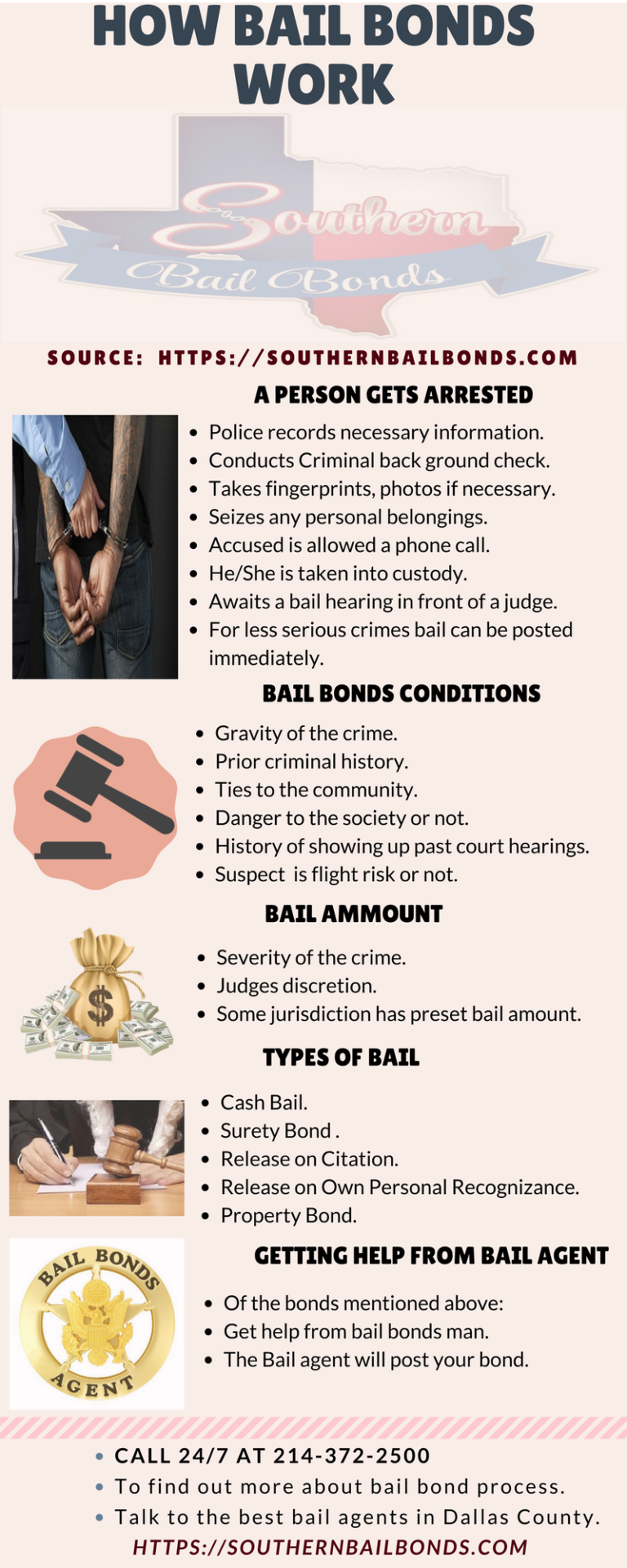Exactly How Bail Bonds Aid You Secure a Swift Release
Bail bonds act as a vital system for people browsing the intricacies of the criminal justice system, offering a pathway to restore liberty promptly complying with an apprehension. By engaging a bondsman and paying a portion of the overall bail amount, accuseds can address both legal commitments and individual responsibilities without the immediate concern of full repayment. This procedure not just helps to protect one's public photo however likewise helps with a smoother transition during a tough time. However, the intricacies of this system typically punctual questions-- what are the specific benefits, and just how do they absolutely impact the overall experience?
Comprehending Bail Bonds
Bond bonds serve as an essential mechanism in the legal system, providing people with a means to protect their release from protection while awaiting test. This monetary plan allows offenders to post bond, which is a set amount established by the court, ensuring their look at future court dates. When an offender can not pay for the complete bail quantity, they may look for support from a bail bond firm, which typically bills a fee, commonly around 10% of the total bond amount.
The bail bond operates as a guarantee to the court that the accused will adhere to all lawful obligations. The bail bond firm is responsible for paying the full bond quantity if the defendant stops working to appear in court. This threat incentivizes the company to make sure that the accused turns up for their set up hearings.
Understanding the conditions of a bail bond is crucial for anyone considering this option. It is necessary to acknowledge that bail bonds do not cover other costs or lawful costs related to a test. People need to be educated regarding their responsibilities and civil liberties when getting in into a bail bond agreement. This knowledge can significantly influence the end result of their lawful circumstance.
The Role of a Bail Bondsman
Just how does a bail bondsman help with the launch of accuseds from custody? A bail bondsman, likewise referred to as a bail bonds agent, plays a critical duty in the bail procedure by providing the financial resources necessary to safeguard an offender's launch from jail - bail bonds licking county. When a defendant can not pay for the complete bond amount established by the court, the bondsman actions in to cover this expense, typically billing a non-refundable premium, usually a percent of the complete bail
Once the premium is paid, the bail bondsman secures the accused's release by signing a surety bond with the court. This bond guarantees that the accused will stand for all scheduled court hearings. If the defendant stops working to appear, the bail bondsman is in charge of paying the complete bond amount to the court, which incentivizes the bail bondsman to make certain the offender complies with their court responsibilities.
In addition, bail bondsmans commonly evaluate the threat related to each instance, examining the defendant's background, connections to the area, and probability of appearing in court (bail bonds licking county). This threat assessment educates the regards to the bond and may consist of collateral demands, additionally making certain the bondsman's financial investment is shielded throughout the lawful process
Benefits of Making Use Of Bail Bonds
Making use of bail bonds gives numerous benefits for defendants encountering lawful obstacles. Among the primary advantages is the monetary relief it uses. When individuals are restrained, protecting their launch typically needs a substantial sum, which might be uncontrollable for several. Bond bonds permit accuseds to pay a portion of the total bail amount, generally around 10%, therefore relieving the instant monetary worry.

In addition, collaborating with a bail bondsman provides accessibility to professional support through the complicated lawful landscape. Bondsmen are educated concerning Continue the lawful system and can offer useful suggestions, ensuring accuseds comprehend their duties and rights. This professional support can be crucial in safeguarding a positive outcome in court.
Lastly, using a bail bond can help maintain an offender's public photo and employment condition, which could be detrimentally influenced by prolonged apprehension. Overall, the benefits of bond bonds extend beyond monetary considerations, promoting security during a challenging time.
The Bail Process Discussed
Comprehending the bond process is crucial for any person navigating the intricacies of the legal system. The bond procedure begins after a person is jailed and brought previously a judge. During the preliminary look, the court determines whether bail applies and establishes the quantity based upon the severity of the costs, the defendant's criminal background, and trip threat.
When bond is set, the offender has numerous choices for safeguarding their launch. In this situation, a co-signer or the accused pays a non-refundable charge, typically 10% of the complete bail amount, to the bail bondsman, that after that covers the full bond.
Upon settlement, the bondsman data required documentation, and the accused is released from custodianship. It is critical to comprehend the responsibilities involved, including attending all court hearings and following any problems established by the judge, as dui bail bonds failure to do so can lead to a forfeit of the bail and added lawful effects.
Common Misunderstandings Concerning Bond

An additional common mistaken belief is that bail amounts are globally set and stable. Actually, judges have discretion in establishing bond amounts based upon different factors, consisting of the nature of the criminal offense, the offender's criminal history, and trip risk. Additionally, several believe that just affluent people can pay for bail, overlooking the existence of bail bonds, which supply a more easily accessible monetary remedy.
Some also think that bail is a punishment, not understanding that it acts as a device to guarantee defendants stand for their court days while keeping their freedom throughout the legal procedure. a affordable bail bonds Lots of individuals are not aware that bail is not a right; it can be rejected under specific circumstances, especially in severe crimes or repeat offenses. Quality on these mistaken beliefs is necessary for educated choices pertaining to bond and the overall lawful procedure
Final Thought

When a defendant can not afford the full bail amount, they may seek support from a bail bond business, which normally bills a fee, commonly around 10% of the complete bail amount.
If the defendant falls short to appear in court, the bail bond company is liable for paying the full bail amount. A bondsman, additionally known as a bond bonds agent, plays an important duty in the bond procedure by providing the monetary sources required to protect an offender's release from jail. Bond bonds permit offenders to pay a fraction of the complete bond amount, usually around 10%, thus minimizing the immediate financial burden.
In this instance, a co-signer or the accused pays a non-refundable fee, commonly 10% of the total bail quantity, to the bond bondsman, that then covers the full bail.
 Heath Ledger Then & Now!
Heath Ledger Then & Now! Suri Cruise Then & Now!
Suri Cruise Then & Now! Tina Louise Then & Now!
Tina Louise Then & Now! Christy Canyon Then & Now!
Christy Canyon Then & Now! Peter Billingsley Then & Now!
Peter Billingsley Then & Now!